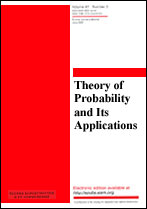|
This article is cited in 1 scientific paper (total in 1 paper)
Short Communications
Conditional zero-one laws
K. Hess
Technische Universität Dresden
Abstract:
We say that a class of events fulfills a
conditional zero-one law if it is a subset of the completion of
the conditioning $\sigma$-algebra. In this case the conditional
probability of an event of the class is an indicator function.
Therefore the conditional probability takes almost surely only
the values zero and one; in the unconditional case the indicator
functions are almost surely constant.
We consider two special zero-one laws. If a
sequence of random variables is conditionally independent, then
its tail $\sigma$-algebra fulfills a conditional zero-one law;
this generalizes Kolmogorov's zero-one law. If the sequence is
even conditionally identically distributed, then its permutable
$\sigma$-algebra, which contains the tail $\sigma$-algebra,
fulfills a conditional zero-one law; this generalizes the
zero-one law of Hewitt and Savage.
Keywords:
conditional probability, conditional independence, zero-one law.
Received: 02.06.2000
Citation:
K. Hess, “Conditional zero-one laws”, Teor. Veroyatnost. i Primenen., 48:4 (2003), 828–834; Theory Probab. Appl., 48:4 (2004), 711–718
Linking options:
https://www.mathnet.ru/eng/tvp261https://doi.org/10.4213/tvp261 https://www.mathnet.ru/eng/tvp/v48/i4/p828
|


|




 Contact us:
Contact us: Terms of Use
Terms of Use
 Registration to the website
Registration to the website Logotypes
Logotypes








 Citation in format
Citation in format 
